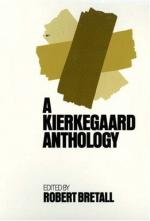|
This section contains 889 words (approx. 3 pages at 400 words per page) |

|
How is Knowledge Possible?
The Philosophical Fragments were written in order to set-up the question that is answered by the Concluding Unscientific Postscript. However, the question may in some ways be the more important task. Kierkegaard's question is "How far does the Truth admit of being learned?" It may initially seem that man cannot have real knowledge. He is concerned too much with his present circumstances and is shaped too much by historical factors to have any real mental contact with the world of things as they are, or with "eternal consciousness." How can consciousness reach outside of itself? After all, are not we always taking our own perspective? How can an objective perspective even be possible?
Kierkegaard argues that Socrates thinks that we find the truth in ourselves. In the Socratic Dialogue known as the Meno, Socrates tries to show Meno that he has certain truths innate within...
|
This section contains 889 words (approx. 3 pages at 400 words per page) |

|




